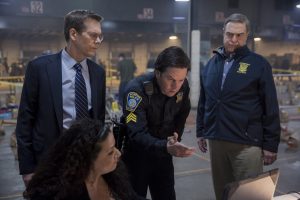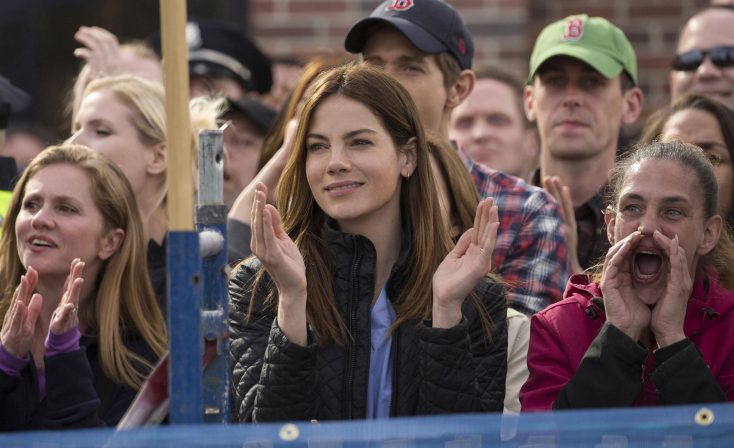
(Standing; left to right) Kevin Bacon; Mark Wahlberg and John Goodman in PATRIOTS DAY. ©CBS Films/Lionsgate. CR: Karen Ballard.
By ANGELA DAWSON
Front Row Features
HOLLYWOOD—In 2013, the lives of three people, including a child, were cut short, 264 more were wounded and an entire major metropolitan U.S. city was gripped in horror as a pair of terrorists set off two powerful homemade bombs near the finish line of the crowded Boston Marathon. How the community and law enforcement rallied in the ensuing four days, as officials tracked down the perpetrators is chronicled in Peter Berg’s thriller “Patriots Day.”
The tense and action-packed drama stars Mark Wahlberg, Kevin Bacon, John Goodman, J.K. Simmons, and Michelle Monaghan. While most of the characters are based on actual people, Wahlberg’s Boston police officer is a composite of three law enforcement individuals who put their own lives at risk to assist the injured and track down the terrorists who, following the bombings, were on the loose continuing to wreck havoc—including murdering a police officer in his squad car—and plotting more devastation over the next four days. Thanks to diligent police work and some lucky breaks in the case, the police managed to track down the two terrorists, who happened to be brothers. One was killed in a firefight with officers in neighboring Watertown, Mass., and the other was captured while hiding in a boat.
According to Berg, who co-wrote the script, and Wahlberg, who serves as a producer as well as stars in the film, the drama is based on real life accounts including those of first responders, hospital workers, law enforcement investigators, government officials, residents of the community and survivors of the heinous act. The drama follows the lives of several people, including a newlywed couple whose lives were forever changed when they were struck by shrapnel from the powerful bombs, a foreign exchange student who was carjacked by the fugitives but managed to escape and give a description of the pair to law enforcement as well as government officials, the police and FBI investigators who worked cooperatively and tirelessly to track down the perpetrators.
What is most remarkable about the film is how soon after the tragedy it has been brought to the screen. Filming commenced on “Patriots Day” less than three years after the tragedy shot on location and near the sites where the actual events took place. Hundreds of extras were enlisted to help out, some of whom were directly impacted by the bombings. For the filmmakers, it was about showing how dedication, personal acts of bravery and Boston itself (and by extension, the country) was able to emerge from these events stronger and more unified. They also say they wanted to show that love inevitably triumphs over evil.
During a press conference, Berg and his cast spoke about their commitment to making “Patriots Day.”
Q: Mark, your character is an amalgam of officers you spoke with, right?
Wahlberg: Yes. Basically, it’s a combination of three officers. By doing that, we were able to boil down what happened over the course of 100 hours into a two-hour movie.
Q: Peter, the story is a fascinating mix of the story and the procedural. How to did your gut guide you to make sure those two sides got their due and fit in with each other?
Berg: Mark and I talked a lot about not wanting to make a film that devolved into something that felt overly action-oriented or suspense-oriented. If you analyze what happened from the time prior to the bombing to the time (terrorist) Dzohkar Tsarnaev was caught in the boat, there are obviously a lot of really intense things that happened. There was a carjacking, a violent gunfight and, obviously, a two bombs that went off. We were aware the movie could have easily turned into what is classified as a thriller or action film. That was never our intention. We were really interested in exploring how a community comes together and how a community processes and moves through and past something as horrific as your child getting killed in front of you at a marathon. We really wanted to explore the themes of love, inclusion and support. We wanted that to be the primary takeaway of the film—love wins. So as we were editing the film and working on the script, we wanted to make sure that we never lost track of that.
Q: Mark, this is a true ensemble film. It’s not a one-person star vehicle for you or anybody. At the same time, as a native son of nearby Dorchester, Mass., you really did consider yourself the face of this project to a lot of the public. How conscious were of that and how did that affect how you behaved and went about producing this film?
Wahlberg: I was extremely aware of it. There comes a lot of responsibility and pressure with that because I like to go home and show my face and be welcome with open arms. They were relieved because they knew it was one of theirs that would be responsible for it and they also would hold me accountable. I just wanted to make sure that everybody else was being held to the highest standard. I knew my brother Pete (Berg) was the perfect guy to make this movie because of how much he cares. As soon as we were able to communicate what our intentions were, everybody felt a huge sigh of relief. But, yeah, it comes with a lot of pressure for sure.
Q: Michelle, your scenes with Mark where you play his supportive wife, particularly in the beginning of the film, were such a fascinating counterpoint to the horror we see later. How did you go about creating that kind of warmth and comfort that you really get from the domestic scenes?
Monaghan: Mark kind of naturally has it. Mark and I sat down with Pete for an afternoon and we worked on the scenes. I must say that it’s really great working with Pete because he really allows the actors to have a lot of freedom. You essentially have one large stage and you have three or four cameras rolling all at once. You really just continuously do the scene. When you do that, you start to become more comfortable. It’s a really great atmosphere for actors. All of our hearts were in the right place and we really just wanted to convey a side of the story—the untold story—where it was just every day normal people coming together and uniting and feeling fear and helplessness, but at the same time conveying strength and doing heroic things. So starting the film off with just everyday people getting coffee and sending each other off to work and then at the end of the day doing extraordinary things was remarkable.
Q: What happened in Boston remains so raw and recent for many people. What were some of the advantages and disadvantages of starting this project so soon after the bombings took place?
Berg: Because there were so many people affected by this event, we went back to Boston and met with some of these people. The range of experiences was very wide. There were people who were 100 percent supportive of it and there were people who were very skeptical and nervous about it. There were people who were indifferent and people who were bored. There were people who were still in a deep grieving process, just grieving, so all of our interactions were different. It’s hard to generalize an answer to that question. Our approach with Mark, my partner in this, was to sit down with absolutely everybody who we thought would sit down with us. There were so many people that we wanted to meet with and we wanted to be very transparent about what we were doing and really about what we weren’t doing.
We just went out and spent months with the community. It would boil down to why do you want to make this film. Yes, it’s fresh but the advantages of having that experience is that people are more emotionally charged.
When we sat down with Dun Meng (the carjacked victim played in the film by Jimmy O. Yang), he could remember the way Dzohkar smelled. He remembered the sound of (terrorist) Tamerlan Tsarnaev’s fingernails on the gun, and how loud that noise was in his head. We were able to get these micro details, and for an actor and for me they’re very valuable. So that’s good. But, really, everyone was kind of asking why do you want to tell this story and is it too soon, which I think are very valid questions. Yes, this movie is about an event and what happened in Boston is horrific and four people were killed.
Unfortunately, in the world we live in now (four, the number of people killed) is actually a low number for some of these attacks. So in the scope of these attacks, Boston was not even that large of one but it’s very representative of this new reality that we live in where we’re no longer surprised to wake up to see some new horror and some new mass casualty event. We really wanted to make a film about how people process that.
Wahlberg: Pete and I were constantly talking about if it’s too soon, and I just felt like it wasn’t soon enough because these things are continuing to happen, and they will continue to happen, and we need to come together. I’m just proud of how people reacted and proud of how people came together. I’m proud that we can now show audiences what “Boston Strong” really means.
Q: Mark, can you talk about what makes Boston different from other cities and what makes you most proud of your hometown?
Wahlberg: Boston has grown so much in a short amount of time. I remember growing up as a kid and being bused to different areas and there was a huge racial divide. Cut to this horrific incident and everybody from all walks of life coming together to help and that made me extremely proud to be from Boston. I wanted to share that message.
Q: What specific recollections do you have of meeting Jessica Kensky and Patrick Downes, the couple who lost limbs in the Boston Marathon bombings, and the other people who were impacted by this malicious act?
Wahlberg: I find them so inspiring. I don’t know if I would have the courage to just move forward and look at life and have that light that they shine so brightly. It’s a question I ask myself: if this had happened to myself or to my children, I don’t know if I could … if I was there on the day when the explosions went off, would I run to these people or would I run away in fear? I really don’t know. I hope I never have to answer those questions. But to see how they responded and how they move forward and how they were the ones that made it so clear what the message of the movie was and also the question of whether it’s too soon or if this message needs to be out there right away. This is about love and to see them embrace at the finish line after Patrick ran the race again (earlier this year with a prosthetic leg replacing the one he lost due to the bombing), I’ve never been more inspired and I’ve never been more proud. I could only hope to have a quarter of the courage that both of them possess in one hand. It’s really remarkable and I want to thank them (Patrick and Jessica) again.





